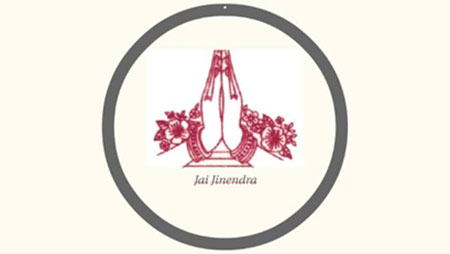Every soul carries a divine essence within. When we embrace the greeting Jai Jinendra and extend it to others, we not only acknowledge the inherent Godliness within them, but also recognize the potential for our own divine nature to blossom and become one with Jai Jinendra someday.
According to historical accounts, Ācārya Bhadrabāhu, the revered spiritual teacher and mentor of Chandragupta Maurya, is credited with introducing the salutation Jai Jinendra. It is believed that Ācārya Bhadrabāhu imparted this powerful expression to convey reverence and victory to the Jina, signifying the supreme state of spiritual attainment.
Jai Jinendra is a compound Sanskrit word derived from the words Jai + Jina + Indra. Here ‘Jai’ is used to praise or honour, ‘Jina’ refers the pure soul who has conquered all inner passions and possess Kevalajñāna (pure infinite knowledge) and the word ‘Indra’ means Chief or Lord. Thus, Jai Jinendra can be translated as “Victory to the Lord of Conquerors” or “Hail to the Supreme Soul who has conquered all attachments and desires” and is used to praise the qualities of Jina. There are some viewpoints to understand the spirituality behind it.
Empirical View: I bow down to those pure souls who have conquered over all five senses and desires.
Transcendental View:
- I bow down to those pure souls who have conquered over attachment, hatred, and passions.
- I bow down to infinite Tirthankars, Arihants and Siddhas of past, present, and future.
- I bow down to those omniscient souls who are knower-seer of universe of 14 Rajlokas.
- I bow down to those liberated souls who have attained ultimate knowledge and venerated their self-soul only.
- I bow down to the Pañca-Parameṣṭhi.
- I bow down to those who cut down the heaps of karmic bondages.
- Lord Indra is considered is a leader of all Gods, he is having all riddhi-siddhi (luxurious), even then he does Pancānga-Namaskāra to those supreme souls and he wishes to be like such soul. Likewise, I bow down to the Jineśvara.
Supreme Transcendental View:
- I bow down to that Jineśvara, Vītarāgī or Sarvajña that exists in my dravya (substance) or pure soul.
- I bow down to my divine soul.
- I bow down to my own nature.
- I bow down to sva-samaya.
- I bow down to my conscious soul.
- I bow down to my self-proclaimed soul.
The profound expression “Jai Jinendra” encapsulates a wealth of virtues and transformative qualities. It embodies love, discipline, modesty, and respect, seamlessly interwoven into its essence. When we embrace this mantra, it teaches us the art of surrender, guiding us to bow down in humility and dissolve our ego. As a result, anger loses its grip on us, and the complexities of our mind unravel into simplicity.
Jai Jinendra holds within it the power to instill virtues such as humility, nurturing a deep sense of reverence for all beings. Through this devotion, not only do we gain spiritual growth, but those whom we revere, and worship also find inspiration to further embody the divine qualities represented by Jai Jinendra.
Remarkably, this expression erases the boundaries of age, blurring the distinction between elders and the younger generation. It fosters an inclusive atmosphere of unity, where every soul is recognized as a sacred vessel carrying the potential for enlightenment.
By embracing the tradition of greeting each other with Jai Jinendra, family members establish a sacred space where ego, conflicts, and negativity are diminished. It creates an atmosphere of mutual respect, humility, and gratitude, fostering a deep sense of interconnectedness and oneness among all family members. This practice cultivates a strong spiritual foundation within the family, enriching their collective journey towards enlightenment. Its resonance creates a harmonious and peaceful environment, dispelling negativity, and discord. In the presence of this sacred mantra, the forces of disharmony fade away, leaving space for compassion, understanding, and unconditional love to thrive.
In essence, Jai Jinendra is not merely a salutation but a profound philosophy that encompasses the highest virtues of the human spirit. It serves as a guiding light, illuminating the path towards self-realization, fostering unity, and nurturing an atmosphere of peace, harmony, and spiritual awakening.
Just as a single lit matchstick can swiftly engulf an entire cotton factory in flames, the recitation of Jai Jinendra has the potential to swiftly disintegrate heaps of karmas in a mere fraction of a second. It is imperative that we consistently chant Jai Jinendra with the intention of paying homage to our own untainted soul, which possesses infinite attributes and the inherent capacity to attain Nirvāṇa.
It is crucial to approach the recitation of Jai Jinendra with unwavering devotion and faith in the immense potential of our pure soul. This reverential act serves as a powerful reminder of our divine essence and invokes the latent energy within us to propel us towards spiritual liberation.
The sheer power of one salutation, Jai Jinendra, is enough to catalyse the transformation from our current state of existence, known as bhava, to the enlightened state of siddha bhava. This sacred utterance possesses the profound ability to transmute our spiritual journey, elevating our consciousness and dissolving the obstacles in our path.
Bhāvnā me bhāva nahī, to bhāvnā bekāra hai.
Bhāvnā me bhāva hai, to bhava se bedā pāra hai.
Bhāvnā me śuddha-bhāva hai, to “Jai Jinendra” mokṣa-dwāra hai.




Jai Jinendra Pragatiji,
Thank you Pragatiji. Very deeply explained the Meaning of “Jai Jinendra “. So important to know the whole meaning of the most important word and most commonly used by Jains.
Look forward to reading more articles in the future by you. 🙏
Interesting, and valid on many points. However, in the starting paragraph, you have limited and inferred condescending view of the words like Namaste or Jai Shri Ram or Jai Mata di… all three go beyond the word itself. Namaste offers gratitude to the supreme that resides in the person being greeted, the same supreme that presides all things. Jai Shri Ram and Jai Mata Di is acknowledgement of the virtues that one is trying to follow – encompassed, yes by individuals as a “summary” of virtues – which is what you have explained further in your opinion piece.
When one limits one and expands others – differences are created, ultimately of superiority and inferiority. An ethos that is not of our common ancestors and values.